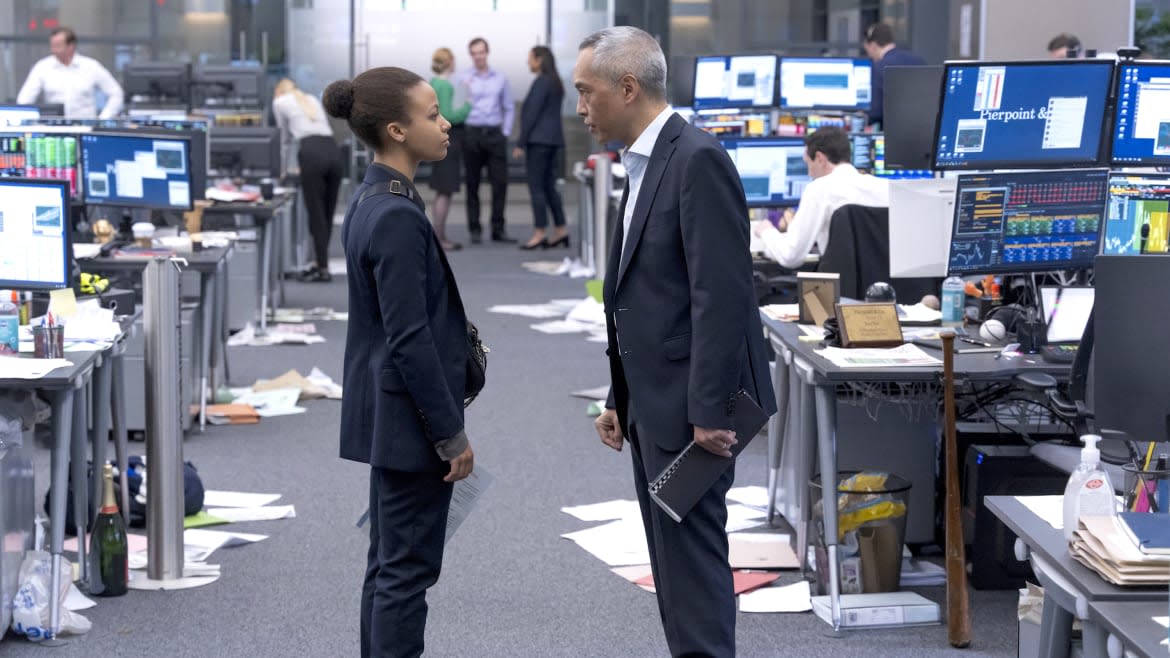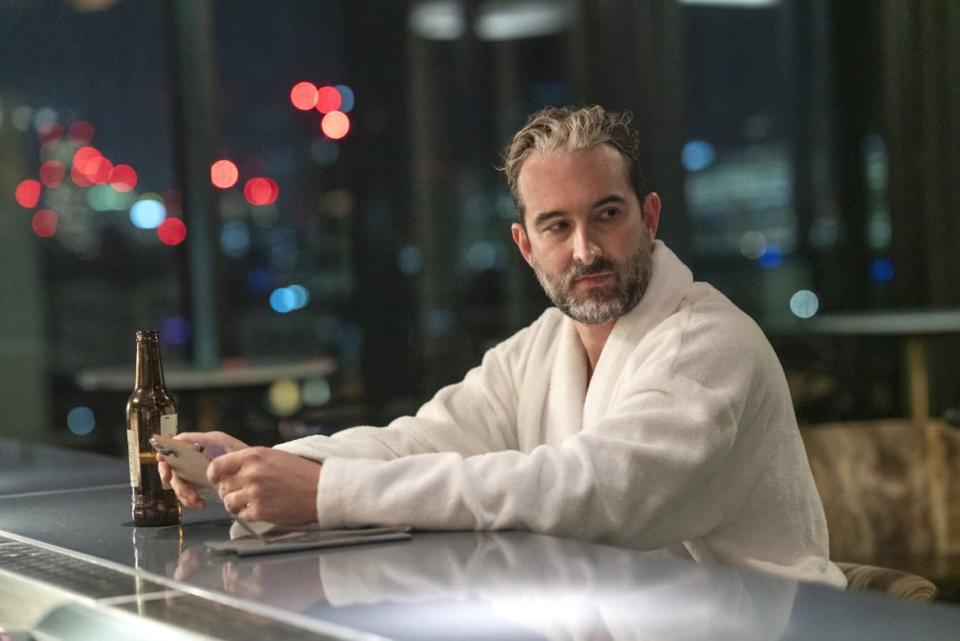‘Industry’ Season 2 Is as Sexy, Druggy, and Gripping as Ever

“Isn’t it lucky that no one’s ever satisfied?” says Eric Tao, played by Ken Leung, to junior colleagues Harper Stern (Myha’la Herrold) and Rishi Ramdani (Sagar Radia) before bursting into laughter in Industry Season 2.
This cynical yet gleeful observation might as well be the tagline for the HBO television series, which returns on Aug. 1, about a group of mostly young, hyper-competitive and horny bankers working in the London office of the fictional Pierpoint & Co.
If you savored the complete chaos of Industry’s first season, you might be wondering what else the finance drama—full of graphic sex, drug use and violence of all kinds—has left to showcase in its second round. But as Pierpoint’s terrifying managing director of Cross Product Sales suggests, there’s always more cash to gain, co-workers to undermine, clients to sleep with, and ketamine to snort in the corrupt world of finance. And unlike an equally sensational show like Euphoria, the series’ writers and creators Mickey Down and Konrad Kay have an interest in examining power and pleasure beneath all these pearl-clutching moments.
Industry’s first season arrived in a fairly low-key fashion at the end of 2020, but managed to become a sleeper hit thanks to critics and Media Twitter (probably tweeting about those sex scenes). The first eight episodes were like watching an uncensored, corporate version of Survivor as the central group of post-graduates endured an extremely toxic, stress-inducing work environment with the goal of securing permanent positions at the prestigious bank.
Gugu Mbatha-Raw’s Star Power Redeems ‘Surface’ From Its Shallow Thrills
Some, like crafty American expat Harper, privileged polyglot Yasmin Kara-Hanani (Marisa Abela), and her cum-eating sub Robert Spearing (Harry Lawtey), miraculously withstood downright evil bosses and proved their worth on the trading floor. While others, like Oxford grad Gus Sackey (David Jonsson), were disillusioned by the field. Another (R.I.P Hari) literally died on the job.
In Season 2, the remaining trio are still very much surviving and not exactly thriving in their personal and professional lives. In this particularly depraved ecosystem, there’s never a task, negotiation or transaction that doesn’t present some moral conundrum or require a level of humiliation—no matter how much status you acquire. Noticeably, there’s a stronger focus on the female protagonists in this regard, specifically the ways in which Yasmin and Harper seek opportunities for empowerment in their male-dominated workplace while often reinforcing the status quo.
The season begins three years into the post-grads’ tenures at Pierpoint and a year into the COVID-19 pandemic. After confining herself to a swanky hotel during quarantine, Harper emerges from her COVID funk by nabbing an illustrious new client named Jesse Bloom (also known as Mr. COVID for his rare capital gains during the pandemic) whom she serendipitously shares a floor with. Noted HBO stalwart Jay Duplass plays Bloom to douche-y finance-bro perfection, making the puffer-vested jerks on Succession seem slightly more tolerable. The two engage in a nerve-wracking game of cat and mouse where, in one instance, Bloom makes Harper feel like an equal and, in another, punishes her for not answering his random 12 a.m. calls.
Harper understands that Bloom is treating her like he would a female intern. But their relationship, as well as one she develops with an executive director from the New York office named Danny Van Deventer (Alex Alomar Akpobome), could reap bigger rewards than the one she strategically cultivated with Eric last season—which, as you can imagine, the baseball-bat-wielding hothead doesn’t take well.
Meanwhile, Yasmin seems more comfortable now that she’s been relieved from the supervision of Kenny (Conor MacNeill), her sexist, sadistic line manager, after he seeks rehabilitation—until he returns in another position and can’t shut up about all the “listening and learning” he’s done.
She eventually becomes interested in working private wealth management after meeting an aspirational, stylish French woman named Celeste (Katrine de Candole) from the department. She also becomes entangled with a young Foreign Exchange Sales recruit named Venetia (Indy Lewis), whose defiance of Peirpoint’s oppressive social order makes Yasmin callous and resentful, despite what she endured her first year.
Both women reflect the two options Yasmin believes she has as a woman in high finance: the girlboss or the game-changer. This leads her on a dizzying, often disappointing journey of self-fulfillment that includes reuniting with her estranged playboy father and making some surprising (but not so surprising) choices at her female co-worker’s expense.
Viewers can probably thank newly recruited executive producer Jami O’Brien for this season being so interested—and confident—in showcasing the limits of girlbossery and the type of violence women can inflict on each other. Last season contained this sort of post-feminist skepticism. But in Season 2, the show is able to build on these ideas in incisive ways without veering into misogynistic, misguided territory about how power operates. Additionally, the majority of the episodes, like Season 1, are directed by women.
The men are less of a focal point—that is, until their emotional subplots and stellar performances sneak up on you in effective ways. Eric is given the main character treatment for a few episodes, as his past working at Pierpoint’s New York office is rehashed and as he struggles to remain a dominating force. Nicole (Sarah Parish), the client who molested Harper during a car ride in Season 1, returns as a client of Robert’s, which leads to another dom-sub situation with some tragic implications. And, despite giving the middle finger to Pierpoint last season, Gus remains in the picture when Harper gets him a job tutoring Bloom’s son and later finds himself working a low-level job in politics.

Jesse Bloom (Jay Duplass) in Industry Season 2
The shock value of Industry is certainly dialed down a bit in its sophomore season—perhaps because the first season did such an effective job of teaching viewers how to watch it and what to expect. However, the sex and drug use is still as excessive and graphic as ever. And yet all of its salacious bits feel artfully depicted and necessary given the bleak microcosm these characters operate in. In this world, sex is almost always transactional, complicated, inappropriate, and kind of sad.
Without the straightforward narrative of Industry's first season, there’s more opportunity for episodes to drag and meander, particularly when we peer into characters’ troubled pasts and lives outside of work. We see Harper mention that she appreciates finance because “you’re working in a perpetual present tense.” Likewise, the “present tense” portions of the show, when characters are shouting at each other on the trading floor and in boardrooms, are more thrilling than, say, discussions between Yasmin and her estranged father. But the series always manages to reel you back in with its characters’ sly maneuvering and ruthless power plays—not to mention a handful of what will hopefully be Emmy-nominated performances next year.
Get the Daily Beast's biggest scoops and scandals delivered right to your inbox. Sign up now.
Stay informed and gain unlimited access to the Daily Beast's unmatched reporting. Subscribe now.

 Yahoo News
Yahoo News 
